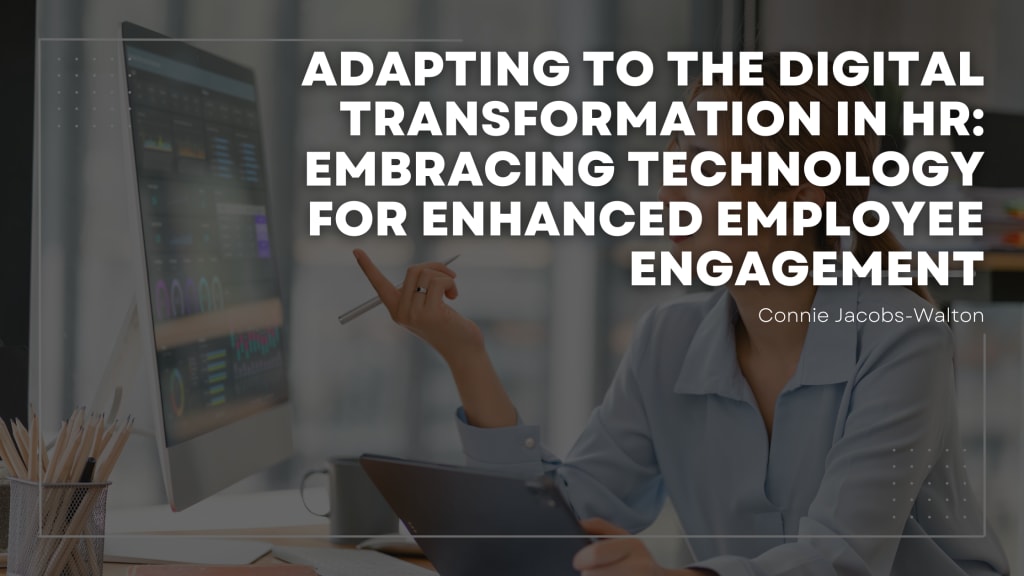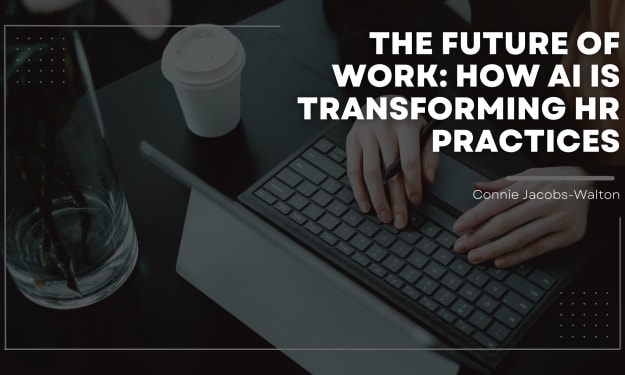Adapting to the Digital Transformation in HR: Embracing Technology for Enhanced Employee Engagement
By: Connie Jacobs-Walton

Nowadays, the term' digital transformation' is used quite often, and it means a new way of doing things, including in the HR department. In the HR domain, digital transformation entails implementing new technologies in the performance of human resource management activities and developing more effective and efficient communication means and tools that are critically important for engaging employees. When business players aim to remain relevant in the market, it is essential that they learn to accept and adapt to this change.
The Evolution of HR Technology
It has been a long evolution from a paper-based process to the use of technology in the field of HR. In the past, most HR tasks were basic and involved a lot of work, such as piles of paperwork and manual data processing. However, with the help of technology, especially technological solutions in the sphere of human resources, these processes have changed. Some of them are implementing HR Information Systems (HRIS), transitioning to cloud-based solutions, and adopting AI.
Advantages of Moving to Digital HR
Digital transformation brings numerous benefits to HR.
Improved Efficiency: This is important because repetitive jobs are tiresome, leading to time wastage and increased likelihood of errors.
Enhanced Decision-Making: Analytics are helpful in making informed decisions as they give the correct information.
Better Employee Experience: Such process flow and self-service applications enhance employee satisfaction from an overall perspective.
It is imperative to identify the core technologies that drive HR transformation in order to assess their feasibility, effectiveness, and potential for success.
Core Technologies Driving HR Transformation
Several technologies are at the forefront of HR digital transformation:
Artificial Intelligence and Machine Learning
AI and ML are also reshaping HR, where some responsibilities are being automated, and others are getting predictive insights. AI is now enhancing everything from screening resumes to identifying the need for and delivering custom training sessions.
Cloud Computing
It is cloud-based and very flexible, scalable, and accessible. It allows the HR professional to access information at any time, anywhere, improving the general management of human resource activities.
Big Data Analytics
Extensive data analysis assists HR departments in making sound decisions that are informed by quantitative data. Thus, by drawing on trends and patterns, HR can forecast future requirements and strategies and promote employee involvement.
Social Media Integration
Social media has already become a required tool in HR. Some examples include its usage in social recruiting and as a tool for amplifying employee voice, which enables business entities to seek talented candidates and improve their image.
Artificial Intelligence in HR
AI is making significant strides in HR.
AI in Recruitment
AI substitutes resume review and candidate filtering as it helps identify the best match for an organization. This one guarantees that the process of selecting candidates is quicker, has no bias, and is more efficient.
AI in Employee Development
AI makes it easy to have a learning platform that caters to individual needs, monitors progress, and even recommends career growth paths, hence increasing the chances of keeping employees.
Cloud Computing in HR
The benefits of cloud-based HR systems are manifold
Scalability: It can be easily expanded or collapsed depending on what is best for the company.
Accessibility: Use data regardless of the location, making it suitable for remote work and everyday use.
Cost-Effective: Eliminate the need for some of the physical assets and their subsequent maintenance costs.
Examples of Cloud HR Platforms
Major cloud-based HR solutions are offered through Workday, SAP SuccessFactors, and Oracle HCM Cloud, where payroll to performance management options are available.
Big Data Analytics in HR
Big data analytics is a game-changer for HR:
Predictive Analytics for Workforce Planning
Predictive analytics helps forecast future workforce needs, identify potential turnover risks, and plan for succession.
Data-Driven Decision Making
Data will help the HR department make strategic decisions about attracting talents, maintaining their engagement, and managing performance.
Social Media Integration in HR
Social media is reshaping HR practices:
Social Recruiting
LinkedIn, Facebook, and Twitter are some of the sources used in the recruitment process to reach more people and find the most qualified candidates.
Employee Advocacy Through Social Media
Encouraging employees to post work experiences on social media platforms helps the company market its brand image and attracts other potential employees.
Challenges in Adapting to Digital Transformation
Despite its benefits, digital transformation in HR comes with challenges:
Resistance to Change
Subordinate to organizational-level factors, individuals may reject new technologies out of fear of the unfamiliar or of changing the status quo.
Data Security Concerns
As technology use within organizations increases, the privacy of employees' data will always need to be protected.
Skill Gaps in the Workforce
Upskilling employees is necessary with change, especially when it comes to new technologies, and this is not a trivial process.
Strategies for Successful Digital Transformation in HR
To navigate these challenges, companies should adopt the following strategies:
Building a Digital Culture
Creating awareness and acceptance of new technology and innovation forms the core of digital transformation.
Continuous Training and Development
The training and development programs are essential as they keep the employees abreast with the new technologies in the market so that they can take advantage of them.
Investing in the Right Technology
The selection of tools and appropriate platforms that meet the company's objectives and requirements is also critical.
Trends That Will Shape HR Technology in the Future
Virtual Reality (VR) as a Training Aid
The use of VR makes training more engaging, and the learners can have first-hand experience of what they are being trained on.
Blockchain for Security of Employee Data
Blockchain technology safeguards employee data and minimizes the chances of leakage.
It is imperative to look at HRM digital transformation not as a trend but as a necessity in today's dynamic business environment. Here, the technology means the application of innovative tools to improve employees' interactions, optimize the workflow, and leverage analytics. In the future, this will be an essential factor in ensuring that the organization remains relevant in the market regarding technological developments.
About the Creator
Connie Jacobs-Walton
An HR expert with more than 20 years of experience, Connie Jacobs-Walton. She can be found in Atlanta, Georgia. Visit ConnieJacobsWalton.net for more info.
Enjoyed the story? Support the Creator.
Subscribe for free to receive all their stories in your feed. You could also pledge your support or give them a one-off tip, letting them know you appreciate their work.






Comments
There are no comments for this story
Be the first to respond and start the conversation.